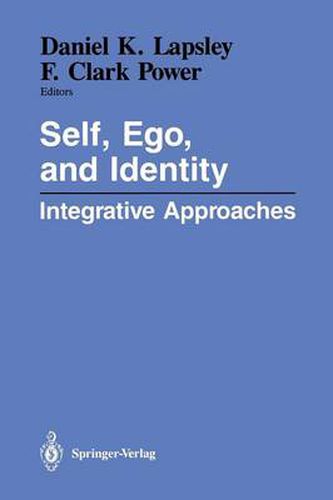Readings Newsletter
Become a Readings Member to make your shopping experience even easier.
Sign in or sign up for free!
You’re not far away from qualifying for FREE standard shipping within Australia
You’ve qualified for FREE standard shipping within Australia
The cart is loading…






This title is printed to order. This book may have been self-published. If so, we cannot guarantee the quality of the content. In the main most books will have gone through the editing process however some may not. We therefore suggest that you be aware of this before ordering this book. If in doubt check either the author or publisher’s details as we are unable to accept any returns unless they are faulty. Please contact us if you have any questions.
In the midst of the cognitive revolution, there has been a veritable ex plosion of interest in topics that have been long banished from academic consideration under the intellectual hegemony of behaviorism. Most notably, notions of self, ego, and identity are reasserting themselves as fundamental problems in a variety of research traditions within psychol ogy and the social sciences. Theoretical models, review articles, edited vol umes, and empirical work devoted to these constructs are proliferating at a dizzying rate. This clearly attests to the renascent interest in these topics, the vitality of these research paradigms, and the promise that these constructs hold for explaining fundamental aspects of human development and behavior. Although the renewed academic interest in self, ego, and identity is obviously an exciting and healthy development, there is always the tenden cy for research to take on a parochial character. When boundaries are erected among different theoretical perspectives, when empirical findings are viewed in isolation, when theories are too sharply delimited and segre gated from other domains of behavior, then what may seem like progres sive, healthy, and content-increasing tendencies in a research paradigm may turn out to be, on closer inspection, merely an inchoate thrashing about. Fortunately there is an internal dynamic to scientific investigation that tends to combat this degenerating tendency. There is something about the rhythm of science that bids us to transcend parochial theoretical in terests and seek the most general theory.
$9.00 standard shipping within Australia
FREE standard shipping within Australia for orders over $100.00
Express & International shipping calculated at checkout
This title is printed to order. This book may have been self-published. If so, we cannot guarantee the quality of the content. In the main most books will have gone through the editing process however some may not. We therefore suggest that you be aware of this before ordering this book. If in doubt check either the author or publisher’s details as we are unable to accept any returns unless they are faulty. Please contact us if you have any questions.
In the midst of the cognitive revolution, there has been a veritable ex plosion of interest in topics that have been long banished from academic consideration under the intellectual hegemony of behaviorism. Most notably, notions of self, ego, and identity are reasserting themselves as fundamental problems in a variety of research traditions within psychol ogy and the social sciences. Theoretical models, review articles, edited vol umes, and empirical work devoted to these constructs are proliferating at a dizzying rate. This clearly attests to the renascent interest in these topics, the vitality of these research paradigms, and the promise that these constructs hold for explaining fundamental aspects of human development and behavior. Although the renewed academic interest in self, ego, and identity is obviously an exciting and healthy development, there is always the tenden cy for research to take on a parochial character. When boundaries are erected among different theoretical perspectives, when empirical findings are viewed in isolation, when theories are too sharply delimited and segre gated from other domains of behavior, then what may seem like progres sive, healthy, and content-increasing tendencies in a research paradigm may turn out to be, on closer inspection, merely an inchoate thrashing about. Fortunately there is an internal dynamic to scientific investigation that tends to combat this degenerating tendency. There is something about the rhythm of science that bids us to transcend parochial theoretical in terests and seek the most general theory.